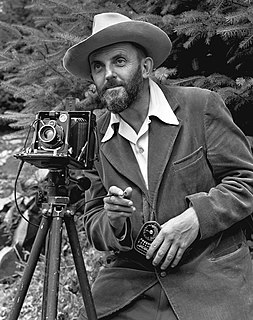 W
WAnsel Easton Adams was an American landscape photographer and environmentalist known for his black-and-white images of the American West. He helped found Group f/64, an association of photographers advocating "pure" photography which favored sharp focus and the use of the full tonal range of a photograph. He and Fred Archer developed an exacting system of image-making called the Zone System, a method of achieving a desired final print through a deeply technical understanding of how tonal range is recorded and developed in exposure, negative development, and printing. The resulting clarity and depth of such images characterized his photography.
 W
WWilliam Charles Ayers is an American elementary education theorist. During the 1960s, Ayers was a leader of the Weather Underground militant group, described by the FBI as a terrorist group, that opposed US involvement in the Vietnam War. He is known for his 1960s radical activism and his later work in education reform, curriculum and instruction.
 W
WRich Benjamin is an American cultural critic, anthropologist, and author.
 W
WArthur Asa Berger is Professor Emeritus in Broadcast and Electronic Communication Arts at San Francisco State University.
 W
WAvram Noam Chomsky is an American linguist, philosopher, cognitive scientist, historian, social critic, and political activist. Sometimes called "the father of modern linguistics", Chomsky is also a major figure in analytic philosophy and one of the founders of the field of cognitive science. He is Laureate Professor of Linguistics at the University of Arizona and Institute Professor Emeritus at the Massachusetts Institute of Technology (MIT), and is the author of more than 150 books on topics such as linguistics, war, politics, and mass media. Ideologically, he aligns with anarcho-syndicalism and libertarian socialism.
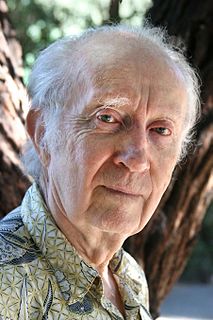 W
WJohn Boswell Cobb, Jr. is an American theologian, philosopher, and environmentalist. Cobb is often regarded as the preeminent scholar in the field of process philosophy and process theology, the school of thought associated with the philosophy of Alfred North Whitehead. Cobb is the author of more than fifty books. In 2014, Cobb was elected to the prestigious American Academy of Arts and Sciences.
 W
WArthur Coleman Danto was an American art critic, philosopher, and professor at Columbia University. He was best known for having been a long-time art critic for The Nation and for his work in philosophical aesthetics and philosophy of history, though he contributed significantly to a number of fields, including the philosophy of action. His interests included thought, feeling, philosophy of art, theories of representation, philosophical psychology, Hegel's aesthetics, and the philosophers Friedrich Nietzsche and Jean-Paul Sartre.
 W
WDaniel Clement Dennett III is an American philosopher, writer, and cognitive scientist whose research centers on the philosophy of mind, philosophy of science, and philosophy of biology, particularly as those fields relate to evolutionary biology and cognitive science.
 W
WGerald Lyn Early is an American essayist and American culture critic. He is currently the Merle Kling Professor of Modern letters, of English, African studies, African American studies, American culture studies, and Director, Center for Joint Projects in the Humanities and Social Sciences at Washington University in St. Louis, Missouri.
 W
WAlice Echols is Professor of History, and the Barbra Streisand Chair of Contemporary Gender Studies at the University of Southern California.
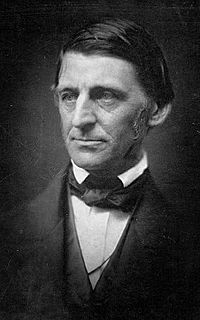 W
WRalph Waldo Emerson, who went by his middle name Waldo, was an American essayist, lecturer, philosopher, abolitionist and poet who led the transcendentalist movement of the mid-19th century. He was seen as a champion of individualism and a prescient critic of the countervailing pressures of society, and he disseminated his thoughts through dozens of published essays and more than 1,500 public lectures across the United States.
 W
WBenjamin Franklin was one of the Founding Fathers of the United States. A polymath, he was a leading writer, printer, political philosopher, politician, Freemason, postmaster, scientist, inventor, humorist, civic activist, statesman, and diplomat. As a scientist, he was a major figure in the American Enlightenment and the history of physics for his discoveries and theories regarding electricity. As an inventor, he is known for the lightning rod, bifocals, and the Franklin stove, among other inventions. He founded many civic organizations, including the Library Company, Philadelphia's first fire department, and the University of Pennsylvania.
 W
WYoshihiro Francis Fukuyama is an American political scientist, political economist, and writer. Fukuyama is known for his book The End of History and the Last Man (1992), which argues that the worldwide spread of liberal democracies and free-market capitalism of the West and its lifestyle may signal the end point of humanity's sociocultural evolution and become the final form of human government. However, his subsequent book Trust: Social Virtues and Creation of Prosperity (1995) modified his earlier position to acknowledge that culture cannot be cleanly separated from economics. Fukuyama is also associated with the rise of the neoconservative movement, from which he has since distanced himself.
 W
WThomas Carl Hartmann is an American radio personality, author, former psychotherapist, businessman, and progressive political commentator. Hartmann has been hosting a nationally syndicated radio show, The Thom Hartmann Program, since 2003 and hosted a nightly television show, The Big Picture, between 2010 and September 2017.
 W
WGloria Jean Watkins, better known by her pen name bell hooks, is an American author, professor, feminist, and social activist. The name "bell hooks" is borrowed from her maternal great-grandmother, Bell Blair Hooks.
 W
WStephen Edwin King is an American author of horror, supernatural fiction, suspense, crime, science-fiction, and fantasy novels. His books have sold more than 350 million copies, and many have been adapted into films, television series, miniseries, and comic books. King has published 62 novels, including seven under the pen name Richard Bachman, and five non-fiction books. He has also written approximately 200 short stories, most of which have been published in book collections.
 W
WLaura Kipnis is an American cultural critic and essayist. Her work focuses on sexual politics, gender issues, aesthetics, popular culture, and pornography. She began her career as a video artist, exploring similar themes in the form of video essays. She is professor of media studies at Northwestern University in the Department of Radio-TV-Film, where she teaches filmmaking. In recent years she has become known for debating sexual harassment and free speech policies in higher education.
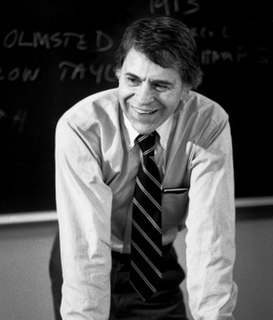 W
WRobert Christopher Lasch was an American historian, moralist, and social critic who was a history professor at the University of Rochester. Lasch sought to use history as a tool to awaken American society to the pervasiveness with which major institutions, public and private, were eroding the competence and independence of families and communities. He strove to create a historically informed social criticism that could teach Americans how to deal with rampant consumerism, proletarianization, and what he famously labeled "the culture of narcissism".
 W
WJohn Leonard was an American literary, television, film, and cultural critic.
 W
WJames Stephen Lindsay, known professionally as James A. Lindsay, is an American mathematician, author, and cultural critic. He is known for his involvement in the grievance studies affair with Peter Boghossian and Helen Pluckrose, the latter with whom he co-authored the nonfiction book Cynical Theories (2020).
 W
WGreil Marcus is an American author, music journalist and cultural critic. He is notable for producing scholarly and literary essays that place rock music in a broader framework of culture and politics.
 W
WSidney Morgenbesser was a Jewish American philosopher and professor at Columbia University. He wrote little but is remembered by many for his philosophical witticisms. One of the best known anecdotes has J. L. Austin claiming that, although a double negative often implies a positive meaning, there is no language in which a double positive implies a negative. To which Morgenbesser retorts: "Yeah, yeah." Another concerns Heidegger's "Why is there something rather than nothing?" To this Morgenbesser's response was: "And if there were nothing? You'd still be complaining!"
 W
WJohn Neal was an American writer, critic, editor, lecturer, and activist. Considered both eccentric and influential, he delivered speeches and published essays, novels, poems, and short stories between the 1810s and 1870s in the United States and Great Britain, championing American literary nationalism and regionalism in their earliest stages. Neal advanced the development of American art, fought for women's rights, advocated the end of slavery and racial prejudice, and helped establish the American gymnastics movement.
 W
WMartha Craven Nussbaum is an American philosopher and the current Ernst Freund Distinguished Service Professor of Law and Ethics at the University of Chicago, where she is jointly appointed in the law school and the philosophy department. She has a particular interest in ancient Greek and Roman philosophy, political philosophy, existentialism, feminism, and ethics, including animal rights. She also holds associate appointments in classics, divinity, and political science, is a member of the Committee on Southern Asian Studies, and a board member of the Human Rights Program. She previously taught at Harvard and Brown.
 W
WCamille Anna Paglia is an American feminist academic and social critic. Paglia has been a professor at the University of the Arts in Philadelphia, Pennsylvania, since 1984. She is critical of many aspects of modern culture and is the author of Sexual Personae: Art and Decadence from Nefertiti to Emily Dickinson (1990) and other books. She is also a critic of contemporary American feminism and of post-structuralism, as well as a commentator on multiple aspects of American culture such as its visual art, music, and film history.
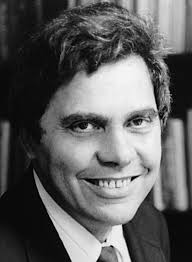 W
WNeil Postman was an American author, educator, media theorist and cultural critic, who eschewed technology, including personal computers in school and cruise control in cars, and is best known for twenty books regarding technology and education, including Amusing Ourselves to Death (1985), Conscientious Objections (1988), Technopoly: The Surrender of Culture to Technology (1992), The Disappearance of Childhood (1994), and The End of Education: Redefining the Value of School (1995).
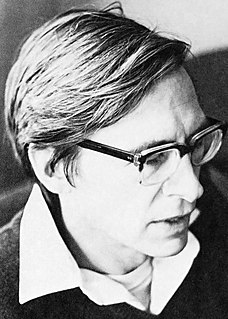 W
WJohn Bordley Rawls was an American moral and political philosopher in the liberal tradition. Rawls received both the Schock Prize for Logic and Philosophy and the National Humanities Medal in 1999, the latter presented by President Bill Clinton, in recognition of how Rawls' work "helped a whole generation of learned Americans revive their faith in democracy itself."
 W
WDouglas Mark Rushkoff is an American media theorist, writer, columnist, lecturer, graphic novelist, and documentarian. He is best known for his association with the early cyberpunk culture and his advocacy of open source solutions to social problems.
 W
WJorge Agustín Nicolás Ruiz de Santayana y Borrás, known in English as George Santayana, was a philosopher, essayist, poet, and novelist. Originally from Spain, Santayana was raised and educated in the US from the age of eight and identified himself as an American, although he always retained a valid Spanish passport. At the age of 48, Santayana left his position at Harvard and returned to Europe permanently.
 W
WArthur Meier Schlesinger Jr. was an American historian, social critic, and public intellectual. The son of the influential historian Arthur M. Schlesinger Sr. and a specialist in American history, much of Schlesinger's work explored the history of 20th-century American liberalism. In particular, his work focused on leaders such as Harry S. Truman, Franklin D. Roosevelt, John F. Kennedy, and Robert F. Kennedy. In the 1952 and 1956 presidential campaigns, he was a primary speechwriter and adviser to the Democratic presidential nominee, Adlai Stevenson II. Schlesinger served as special assistant and "court historian" to President Kennedy from 1961 to 1963. He wrote a detailed account of the Kennedy administration, from the 1960 presidential campaign to the president's state funeral, titled A Thousand Days: John F. Kennedy in the White House, which won the 1966 Pulitzer Prize for Biography or Autobiography.
 W
WJohn F. Szwed is the John M. Musser Professor Emeritus of Anthropology, African American Studies and Film Studies at Yale University and an Adjunct Senior Research Scholar in the Center for Jazz Studies at Columbia University, where he previously served as the Center's Director and Professor of Music and Jazz Studies. Szwed is the author of many books on jazz and American music, including studies of Sun Ra, Miles Davis, Jelly Roll Morton, Alan Lomax and Billie Holiday.
 W
WHenry David Thoreau was an American naturalist, essayist, poet, and philosopher. A leading transcendentalist, he is best known for his book Walden, a reflection upon simple living in natural surroundings, and his essay "Civil Disobedience", an argument for disobedience to an unjust state.
 W
WKurt Vonnegut Jr. was an American writer. In a career spanning over 50 years, he published 14 novels, three short story collections, five plays, and five nonfiction works, with further collections being published after his death.
 W
WBob Wells is an American vandweller, YouTuber, and author. He is noted for being an inspiration to thousands of people who embrace a minimalistic and nomadic lifestyle centered on vandwelling. Wells founded the Rubber Tramp Rendezvous, an annual gathering of vandwellers in Quartzsite, Arizona, and Homes on Wheels Alliance, a charity organization dedicated to the promotion of vandwelling.